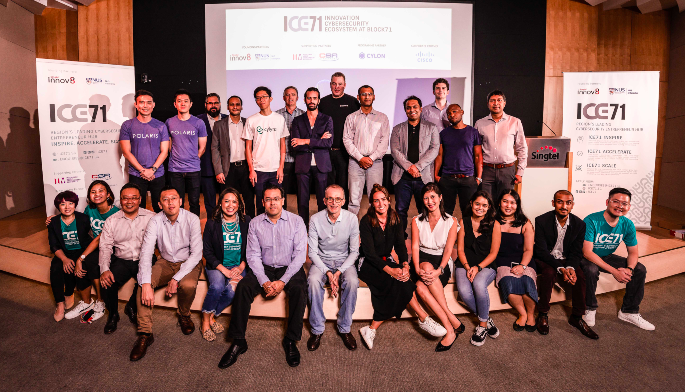
Singapore-based Innovation Cybersecurity Ecosystem at BLOCK71 (ICE71) Accelerate programme has unveiled the ten cyber-security startups that have graduated from its third cohort.
The startups come from diverse backgrounds, originating from seven countries, including Singapore, Australia, Bulgaria, France, India, Nepal and New Zealand. They offer a broad range of cybersecurity solutions targetting consumers, enterprises and governments.
ICE71, a three-month programme, is a partnership between Singtel Innov8 and the National University of Singapore (NUS). Supported by Cyber Security Agency of Singapore (CSA) and Info-Communications Media Development Authority (IMDA), ICE71 focuses on developing and supporting early- and growth-stage cybersecurity entrepreneurs and startups from around the world. It also works with CyLon, a cybersecurity accelerator, originating from London, to support the startups in their growth both locally and internationally.
Applications are now open for ICE71 Accelerate Cohort 4 (taking place from 24 February to 22 May 2020).
Below is a brief about the ten graduates from the third cohort:
Aiculus (Australia): It specialises in applying advanced Artificial Intelligence (AI) to secure Application Programming Interfaces (APIs). The Aiculus’ API product monitors an organisation’s API traffic in real-time, and automatically detects malicious API calls that try to infiltrate and manipulate the organisation’s data and services. This allows organisations to leverage the benefits of APIs without increasing their risk profile as their privacy, data and systems are protected.
BlackScore (Singapore): It has developed an AI-based risk assessment platform for digital identities which can be used for border control and social scoring for credit-worthiness. Using billions of data points of mostly unstructured data, it constructs and scores a digital identity, and allows users to use specific scoring methods to customise results according to their relevance and needs.
Also Read: Why banks will benefit from open API
Buglab (France): It connects companies with a global network of expert cybersecurity researchers through its platform. It taps on the power of blockchain to enable attainable, versatile, and reliable penetration testing for digital enterprise solutions for a fixed price no matter the size of the scope. Buglab helps companies discover and fix vulnerabilities on their digital solutions or assets.
Cyble (Australia): It provides real-time and holistic visibility of supplier cyber threats and risks through automation, integration and intelligence. Using an AI-powered security scoring mechanism, Cyble helps organisations assess cybersecurity risk in their supply chain, provides customised notifications of threats and risks related to their enterprise, operations and supply chain. It also allows them to manage cyber-secure workflows with their vendors.
Cylynx (Singapore): It specialises in blockchain analytics and forensics to simplify compliance processes for regulators, financial institutions and other virtual asset service providers. Cylynx combines open-source intelligence and graph analytics capabilities to trace the provenance of funds on major blockchains. It uses machine learning to detect anomalous patterns and flag suspicious activities. Its risk-based monitoring platform screens blockchain transactions, making compliance seamless, worry-free and secure.
First Watch (New Zealand): It provides industrial and commercial security solutions. Its technology protects core files and equipment and streams real-time provenance-guaranteed data from core Operational Technology devices to a centralised monitoring service. Security teams can analyse and observe an attack as it unfolds, shut down attack vectors and wall off vulnerable devices accurately and swiftly.
FlexibleIR (India): It equips organisations with effective incident response capabilities by providing tool-agnostic, evolving and shareable playbooks to guide teams throughout their training, assessment and incident response journey. FlexibleIR’s platform allows individual analysts to respond to small to large-scale incidents without straining resources. With readily deployable playbooks for multiple clients, it not only helps enterprises of different sizes to improve overall response times and precision, but also improves efficacy and reduces costs for managed security service providers (MSSPs).
Mimirium (Bulgaria): It is a distributed user-owned personal database with an anonymising business interface. It collects users’ information and stores it securely on their devices, forming a decentralised network which can be used to extract aggregated anonymous information. Mimirium ensures total anonymity of their users and provides full protection of their privacy and data – their raw data is not shared with anyone, and can only be accessed by the owner. All users participating in the Mimirium Network are paid for taking part in the campaigns.
Polaris (Singapore): It builds next-generation application security solutions that secure the web presence of internet-facing organisations. Its platform automates traffic analysis and monitoring across multiple web applications with its patented AI engine to improve the accuracy of threat detection, reduce false positives and predict coordinated stealth attacks. The solution is highly customisable and provides round-the-clock managed detection and response.
Seknox (Nepal): Its zero-trust access control platform manages secure access to internal servers and services within the organisation. A zero-trust platform verifies the identity of every user and device trying to connect to its system before granting access to its network resources). The solution unifies adaptive authentication, privileged access management and endpoint security monitoring into a single integrated product which ensures compromised or malicious user access are detected and prevented in real-time.
The post Meet the 10 cybersecurity startups graduating from ICE71 Accelerate programme appeared first on e27.